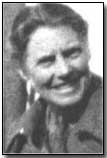Who's Who - Evelina Haverfield
 Evelina Haverfield
(1867-1920) was the daughter of the third Baron and Lady Abinger. She
grew up in a family which valued public and military service.
Evelina Haverfield
(1867-1920) was the daughter of the third Baron and Lady Abinger. She
grew up in a family which valued public and military service.
She married in 1887 Major
Henry Haverfield, an officer in the Royal Artillery, and following his death
in 1895 she married a second time, in 1899, a fellow officer and friend of
her first husband, Major John Balguy.
An accomplished horsewoman, skilled in outdoor sports, and a prominent
activist in the women's suffrage movement before 1914, at the outbreak of
war Evelina rallied women to help meet the threat of a possible German
invasion of Britain.
She originally proposed
forming a women's volunteer rifle corps for home defence so as to support
the Territorials defending the coast. This initial organization
rapidly grew into a much broader support for the war effort, in the Women's
Emergency Corps, the Women's Volunteer Reserve, and the Women's Reserve
Ambulance (Green Cross) Corps.
In early 1915, with the threat of a German invasion greatly diminished,
Evelina joined the Scottish Women's Hospitals and devoted the next two years
to overseas service with them. She served in Serbia as a hospital
administrator and was part of a small group taken prisoner when the armies
of the Central Powers overran Serbia in October and November 1915.
Under appalling conditions
of poverty and military oppression, Evelina and those with
her, struggled heroically through the winter to provide food and basic care
for their wounded Serbian patients and some of the local civilian population. In the spring of 1916,
Evelina and the other 'Scottish Women' were
released through the International Red Cross and returned to England.
In August 1916 Evelina went to Romania in charge of 18 ambulance and
transport vehicles as part of two units of the Scottish Women's Hospitals.
These units were in support of Serbian soldiers fighting on the eastern
Allied front. The stronger enemy invading armies drove the Russian,
Romanian, and Serbian defenders out of southern Romania and north of the
Danube river delta.
During this two-month
retreat by the Allied forces, Evelina and the transport drivers were working
non-stop under constant enemy fire, in desperate situations, while rescuing
wounded soldiers and driving them to safety.
By early 1917, with the fighting on the eastern front over, and unable to
return to Serbia because of the enemy occupation there, Evelina returned to
England, where she remained until after the
Armistice
of November 1918. In England she raised money for clothing and
canteens for Serbian soldiers, gave public speeches on behalf of Serbian
relief, and helped to found a Serbian Red Cross Society in Britain.
After the Armistice she returned to Serbia to supervise the distribution of much needed food, clothing, and medical supplies. When this was done, in 1919, she made plans to found a home for Serbian war orphans in a Serbian mountain village. It was there, in Baijna Bashta, that she contracted pneumonia, probably brought on by overwork and fatigue, and died prematurely at the age of 52, revered and honoured by the Serbs for her five years of humanitarian work on their behalf.
Click here to read an extended feature article on the life of Evelina Haverfield.
Contributed by Boyce Gaddes, author of Evelina: Outward Bound from Inverlochy (Merlin, 1995)
A bunker comprised a fortification largely built below ground level.
- Did you know?
